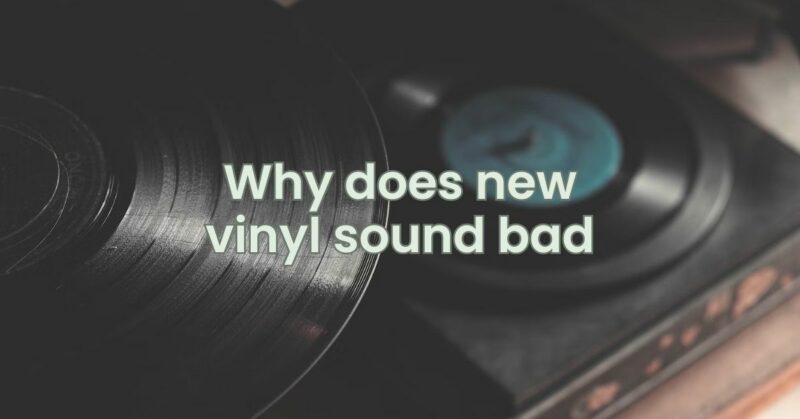Vinyl records have experienced a significant resurgence in recent years, captivating music enthusiasts with their warm sound and tangible appeal. However, some vinyl enthusiasts have reported issues with the sound quality of new vinyl records. It can be disheartening to invest in new vinyl only to find that the sound doesn’t live up to expectations. In this article, we will explore the factors contributing to why new vinyl might sound bad and offer tips to improve your overall listening experience.
Factors Contributing to Poor Sound Quality
- Quality of Pressing Plant: The pressing plant’s quality control processes play a crucial role in determining the sound quality of vinyl records. Some pressing plants may cut corners or use outdated equipment, leading to issues like non-fill, off-center pressing, and surface noise.
- Source Material: The sound quality of a vinyl record is heavily dependent on the source material used for pressing. If the mastering process or digital transfer is poorly executed, it can result in a subpar vinyl release.
- Vinyl Manufacturing Variability: Vinyl is made from a petroleum-based compound, and its quality can vary based on the specific manufacturing process and materials used. Inconsistent vinyl quality can lead to variations in sound reproduction.
- Dynamic Range Compression: Many modern releases, especially in popular music genres, are subject to excessive dynamic range compression during the mastering process. This can lead to a loss of audio fidelity and a less dynamic sound on the vinyl.
- Poor Packaging and Handling: Inadequate packaging and mishandling during shipping can cause damage to new vinyl records, resulting in scratches or warping that affects sound quality.
Tips to Improve Your Listening Experience
- Research the Label and Pressing Plant: Before purchasing new vinyl, research the label and pressing plant’s reputation for quality. Look for reviews and customer feedback to gain insights into their vinyl releases.
- Opt for Audiophile Pressings: Audiophile editions of vinyl records are often mastered and pressed with greater care and attention to sound quality. Look for releases specifically marketed as audiophile editions.
- Check Dynamic Range: Look for vinyl releases that mention “audiophile mastering” or “high-fidelity sound” on the album cover or packaging. These releases are more likely to prioritize audio quality.
- Handle Records with Care: Treat your vinyl records with care to prevent scratches, warping, and surface damage that can affect sound quality. Always handle records by the edges and store them vertically.
- Clean Your Records: Regularly clean your new vinyl records using a proper record cleaning solution and brush. Removing dust and debris can improve sound quality and reduce surface noise.
- Upgrade Your Equipment: Consider investing in high-quality turntables, cartridges, and speakers to enhance the overall sound reproduction of your vinyl records.
- Consider Used or Vintage Vinyl: Vintage vinyl records from earlier pressings might offer better sound quality, as they were often produced with greater attention to detail and sound fidelity.
Conclusion
While some new vinyl releases may suffer from poor sound quality, there are ways to improve your listening experience and enjoy the warmth and charm that vinyl records have to offer. By researching pressing plants and labels, checking dynamic range compression, handling records with care, and upgrading your equipment, you can enhance the sound quality of your vinyl collection. Remember that investing in high-quality releases, vintage vinyl, and properly caring for your records will go a long way in ensuring that your new vinyl sounds as good as it should, delivering the authentic and immersive experience that vinyl enthusiasts cherish.


